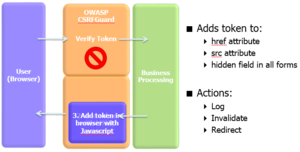This site is the archived OWASP Foundation Wiki and is no longer accepting Account Requests.
To view the new OWASP Foundation website, please visit https://owasp.org
Category:OWASP CSRFGuard Project
OWASP CSRFGuardWelcome to the home of the OWASP CSRFGuard Project! OWASP CSRFGuard is a library that implements a variant of the synchronizer token pattern to mitigate the risk of Cross-Site Request Forgery (CSRF) attacks. IntroductionThe OWASP CSRFGuard library is integrated through the use of a JavaEE Filter and exposes various automated and manual ways to integrate per-session or pseudo-per-request tokens into HTML. DescriptionOverviewOWASP CSRFGuard implements a variant of the synchronizer token pattern to mitigate the risk of CSRF attacks. In order to implement this pattern, CSRFGuard must offer the capability to place the CSRF prevention token within the HTML produced by the protected web application. CSRFGuard 3 provides developers more fine grain control over the injection of the token. Developers can inject the token in their HTML using either dynamic JavaScript DOM manipulation or a JSP tag library. CSRFGuard no longer intercepts and modifies the HttpServletResponse object as was done in previous releases. The currently available token injection strategies are designed to make the integration of CSRFGuard more feasible and scalable within current enterprise web applications. Developers are encouraged to make use of both the JavaScript DOM Manipulation and the JSP tag library strategies for a complete token injection strategy. The JavaScript DOM Manipulation strategy is ideal as it is automated and requires minimal effort on behalf of the developer. In the event the JavaScript solution is insufficient within a particular application context, developers should leverage the JSP tag library. The purpose of this article is to describe the token injection strategies offered by OWASP CSRFGuard 3. JavaScript DOM ManipulationOWASP CSRFGuard 3 supports the ability to dynamically inject CSRF prevention tokens throughout the DOM currently loaded in the user's browser. This strategy is extremely valuable with regards to server-side performance as it simply requires the serving of a dynamic JavaScript file. There is little to no performance hit when the fetched dynamic JavaScript updates the browser's DOM. Making use of the JavaScript token injection solution requires the developer map a Servlet and place a JavaScript HTML tag within all pages sending requests to protected application resources. Developers are strongly encouraged to leverage the JavaScript token injection strategy by default. This strategy requires minimal effort on behalf of the developer as most of the token injection logic is automated. In the event that the JavaScript automated solution may be insufficient for a specific application context, developers should leverage the OWASP CSRFGuard JSP tag library. Note: Use of JavaScript DOM Manipulation is required for Ajax support.
What is CSRFGuard?OWASP CSRFGuard provides:
LicensingThe CSRFGuard project is run by Azzeddine RAMRAMI. He can be contacted at azzeddine.ramrami AT owasp.org. CSRFGuard distributions are currently maintained on GitHub. OWASP CSRFGuard 3.1 is offered under the BSD license |
Presentation & ManualLink to presentation https://www.owasp.org/index.php/CSRFGuard_3_Token_Injection Project LeaderThe CSRFGuard project is run by Azzeddine RAMRAMI. He can be contacted at azzeddine.ramrami AT owasp.org. Related Projects
Ohloh |
Quick DownloadDownload and build the latest source code from GitHub : Download and build the latest source code from GitHub - https://github.com/aramrami/OWASP-CSRFGuard-3 Deprecated Releases - article containing several download references to deprecated and officially unsupported releases
You can download a binary version from Maven Central here: https://oss.sonatype.org/#nexus-search;gav~~csrfguardAzzeddine RAMRAMI (talk) Thanks to Trent Schmidt and Joel Orlina (JIRA) for there help. User Manual(s)OWASP CSRFGuard v3 - series of articles describing the installation, configuration, and deployment of OWASP CSRFGuard v3. News and Events
In PrintThis project can be purchased as a print on demand book from Lulu.com Classifications
| ||
Here a complete CSRF attacks FAQ:
Volunteers
CSRFGuard is developed by a worldwide team of volunteers. The primary contributors to date have been:
- Ahamed Nafeez, Security Engineer.
- Christa Erwin, Security, Programmer/Analyst.
Others
- Eric Sheridan was the original designer of CSRFGuard until 3.0 version.
As of CSRFGuard the priorities are:
- Address any security vulnerabilities around javascript prototype hijacking
- Support for Internet Explorer
- Addressing outstanding issues listed in GitHub
- Support for Multi-part requests
- Add support for the 'Origin' header
Involvement in the development and promotion of CSRFGurd is actively encouraged! You do not have to be a security expert in order to contribute. Some of the ways you can help:
- Make fix to the actual version
- Propose a security enhcement
- Write a complete Architecture Folder for CSRFGurd
- Add an IA engine to detect unknown attacks.
You can sign up for the OWASP CSRFGuard email list at https://lists.owasp.org/mailman/listinfo/owasp-csrfguard
Pages in category "OWASP CSRFGuard Project"
The following 4 pages are in this category, out of 4 total.


